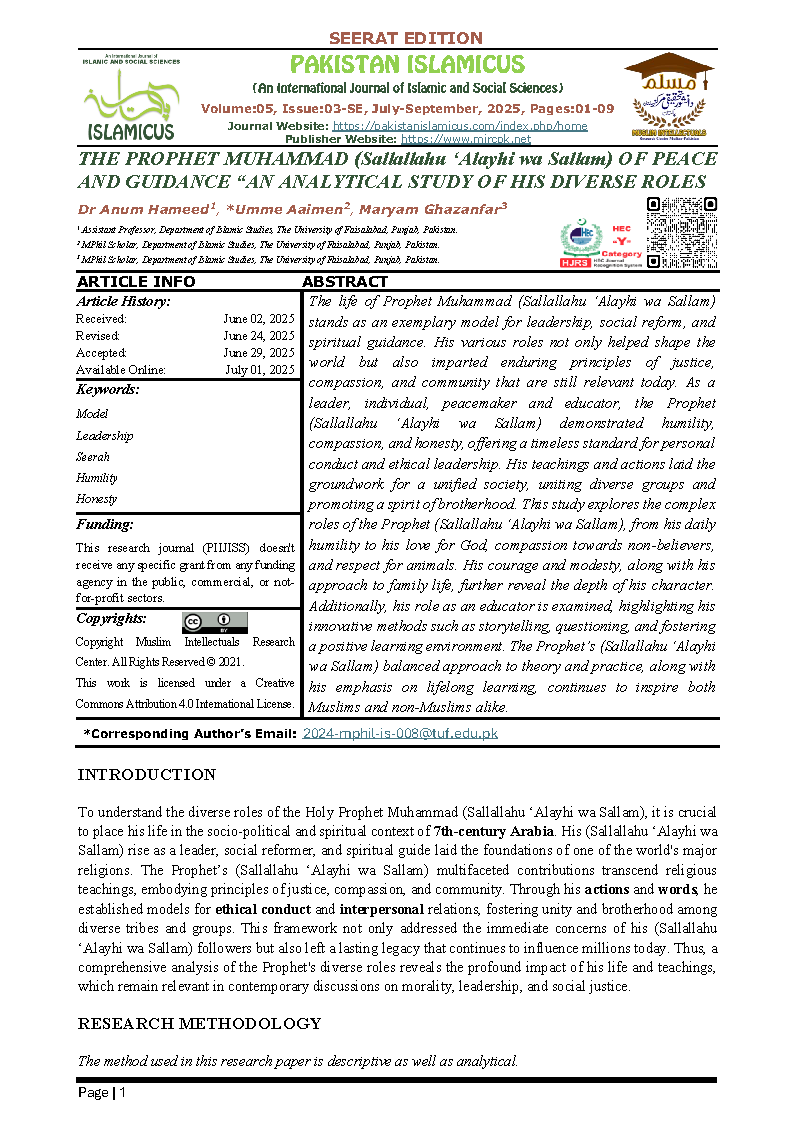THE PROPHET MUHAMMAD (Sallallahu ‘Alayhi wa Sallam) OF PEACE AND GUIDANCE “AN ANALYTICAL STUDY OF HIS DIVERSE ROLES
Keywords:
Model, Leadership, Seerah, Humility, Honesty.Abstract
The life of Prophet Muhammad (Sallallahu ‘Alayhi wa Sallam) stands as an exemplary model for leadership, social reform, and spiritual guidance. His various roles not only helped shape the world but also imparted enduring principles of justice, compassion, and community that are still relevant today. As a leader, individual, peacemaker and educator, the Prophet (Sallallahu ‘Alayhi wa Sallam) demonstrated humility, compassion, and honesty, offering a timeless standard for personal conduct and ethical leadership. His teachings and actions laid the groundwork for a unified society, uniting diverse groups and promoting a spirit of brotherhood. This study explores the complex roles of the Prophet (Sallallahu ‘Alayhi wa Sallam), from his daily humility to his love for God, compassion towards non-believers, and respect for animals. His courage and modesty, along with his approach to family life, further reveal the depth of his character. Additionally, his role as an educator is examined, highlighting his innovative methods such as storytelling, questioning, and fostering a positive learning environment. The Prophet’s (Sallallahu ‘Alayhi wa Sallam) balanced approach to theory and practice, along with his emphasis on lifelong learning, continues to inspire both Muslims and non-Muslims alike.
Downloads
References
Al Quran
Ahmad, Musnad Ahmad, Masnad Imam Ahmed bin Hanbal, Dar ul Minajah, 855 A.D.
Al-Mubarakpuri, Safi-ur-Rahman. Ar-Raheeq Al-Makhtum (The Sealed Nectar). Riyadh: Darussalam, 1996.
Armstrong, Karen. Muhammad: A Prophet for Our Time. HarperOne, 2006.
Bukhari, Muhammad bin Ismail, Sahih Bukhari, Al Jamia, Al Sahih Al Mukhtasir Min Amor Rasoolullah wa Sanana wa Ayamma.
Brown, Jonathan A.C. Muhammad: A Very Short Introduction. Oxford University Press, 2011.
Dawood, Suleman Ibn e Ash’ath Ibn e Ishaq Ibn e Amr Azdi Sajistani, Sunan Abi Dawood, Cairo, 1480 A.H.
Esposito, John L. Islam: The Straight Path. Oxford University Press, 2016.
Ghazzali, Muhammad. Fiqh Us-Seerah: Understanding the Life of the Prophet Muhammad. International Islamic Publishing House, 1999.
Gibbon, Edward. The Rise and Fall of The Saracen Empire, London, 1870
Hart, Michael: A Ranking of The Most Influential Persons in History. Carol Publishing Group, 1993.
Haykal, Muhammad Husayn. The Life of Muhammad. Islamic Book Trust, 1995.
Ibn Maja, Muhammad Bin Yazeed Abu Abdullah, Sunan Ibn e Maja, Dar ul Islam, Riyadh.
Lings, Martin. Muhammad: His Life Based on the Earliest Sources. Islamic Texts Society, 2006.
La Martaine, Alphonse Marie L. Histoire De La Turquie. Nabu Press. Carolina, The United States, 2010.
Muslim, Muslim bin hajaj Nishapuri, Al Jamia Al Sahih, Sahih al Muslim, Dar ul Islam, Riyadh.
Nasr, Seyyed Hossein, ed. The Study Quran: A New Translation and Commentary. HarperOne, 2015.
Ramadan, Tariq. In the Footsteps of the Prophet: Lessons from the Life of Muhammad. Oxford University Press, 2007.
Watt, W. Montgomery. Muhammad: Prophet and Statesman. Oxford University Press, 1961.
Weil, Gustav. A History of Islamic Peoples. (Translated by: Salahuddin Khuda Baksh) Calcutta University Press. 1914.

Downloads
Published
Issue
Section
License
Copyright (c) 2025 PAKISTAN ISLAMICUS (An International Journal of Islamic & Social Sciences)

This work is licensed under a Creative Commons Attribution 4.0 International License.
This work is licensed under a Creative Commons Attribution 4.0 International License.
































